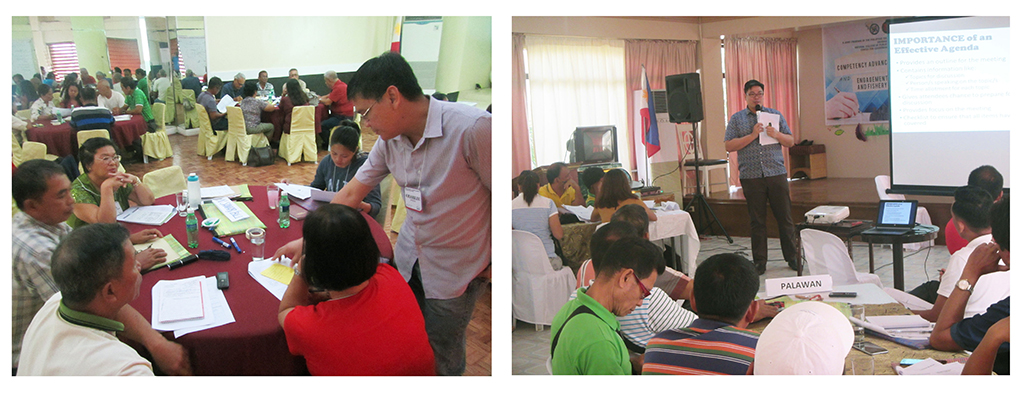
Over 60 Agricultural and Fishery Council (AFC) members from Eastern Visayas and MIMAROPA (Mindoro [Oriental and Occidental], Marinduque, Romblon and Palawan) increased their understanding on policymaking and engagement through trainings in July and August.
The training was initiated by the Philippine Council for Agriculture and Fisheries (PCAF), in partnership with University of the Philippines’ (UP) Center for Leadership, Citizenship, and Democracy (CLCD).
In separate trainings, 34 AFC members from Eastern Visayas joined the team of PCAF and UP-CLCD on July 30 to August 3 in Tacloban City, while another set of 34 AFC members from MIMAROPA participated the training on August 13 to 17 in Batangas City.
The Competency Advancement on Policymaking and Engagement (CAPE) for AFC (AFC-CAPE) aims to enhance the capacities of the Council’s officers and coordinators particularly on policy-related issues, procedural concerns and advocacy to spread stakeholder engagement in consultative and feedback mechanism for sound policy.
“I encourage you to participate actively in the discussion because it will help you improve our accomplishments, especially in preparing policy resolutions,” said RAFC Chairperson Pedrito Kalaw in front of MIMAROPA participants.
Inocencio Morallos, representative of RAFC Eastern Visayas Chairperson Estaban Conchas, assured the new members and newly elected AFC Chairperson(s) will be interested to learn about the Parliamentary Procedures during the AFC-CAPE in Eastern Visayas.
Both trainings followed the same methodology and were facilitated by experts from the UP-CLCD, composed of Dr. Ma. Faina Diola, Prof. Simeon Ilago, Atty. Mark Anthony Gamboa, and Prof. Charlie Cabotaje. The team was assisted by PCAF’s Capacity Development Section (CDS) staff.
Topics discussed include Policy Analysis and Development, Adaptive Uses of Parliamentary Rules in Meetings, Writing Resolutions, and Policy Advocacy. Workshops such as Problem Tree Analysis, Dot-mocracy, and others were also conducted.
In a survey, the AFCs said that they were satisfied with the topics and how the activity was conducted. The CDS also noted that the participants clamored for longer discussion time on the topic of policy advocacy, parliamentary procedure, and writing of resolutions and minutes.
In the Eastern Visayas training, the participants suggested to include in the next trainings topics like facilitating skills, capability building, project proposal preparation and conflict management during meetings.
The survey also revealed that “majority of the participants found themselves prepared to apply their learnings but need more trainings to be fully competent. They also expected some constraints in applying their learning on their area.”
The trainings were part of PCAF’s commitment to assist the AFCs in enhancing their responsiveness to create relevant and sound policy recommendations.
As of this writing, the CDS have conducted seven AFC-CAPE trainings. Aside from the Eastern Visayas and MIMAROPA AFCs, trainings were also conducted in Bicol Region on March 19 to 23 for 36 participants, Northern Mindanao on April 16 to 20 for 39 participants, Caraga on May 7 to 11 for 38 participants, Ilocos Region on June 18 to 22 for 39 participants, and Western Visayas on July 9 to 13 for 37 participants.
Three more trainings will be conducted before the end of the year, specifically in Davao on September 10 to 14, Central Luzon on October 8 to 12, and Cordillera Autonomous Region on November 5 to 9. -JC











